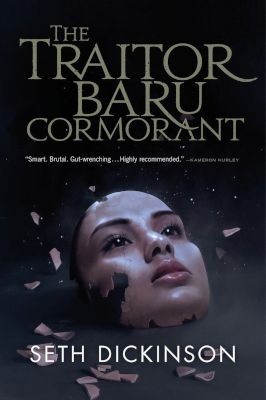The Traitor, Baru Cormorant is an exquisitely detailed book about a queer woman from a colonised people striking out to use her wits and her brains to try and topple that empire from within, and it is written very clearly and well to explore those ideas. You spend a lot of time with Baru herself, which means if she is a character that resonates with you you get to feel her emotional state very deep and true, the constant cleverness, the non-stop backbiting of things she wants to say but won’t because it’s not part of the plan, and her emotional depths when things go badly for her. She is a character who really writes in large letters the struggles of Designed Femininity, where society has mandated a way you can be, and she has to operate within those parameters, all while rankling against them. If you’ve heard me talk about living a life under surveillance, Baru Cormorant is a protagonist who lives that way and what she does to take command of her life. I need you to know this up front because that’s all I’m going to tell you before I start on the Spoiler Warning.
I’m not kidding. Yeah I know. I know! And I’m not even planning on spoiling much of the plot or anything. Yeah it’s that kinda book! Really! I’m going to discuss spoilers for the book, but not in the most specific of ways. Still, this is a book where being surprised is an important part of it, and if you’re the kind of person who wants to feel smarter than the book you’re reading by outwitting it, even knowing the kinds of spoilers can feel like I’m robbing you of some of your fun. I absolutely do not want to diminish the fun of anyone who aims to enjoy this book. And you might! It’s very raw, it’s very real, and it’s extremely high quality work that you should consider reading if any of that seems exciting to you.
I would really recommend reading the audio book, because a lot of the book is dialogue between two characters and I think a good audio book reader would be able to help differentiate those voices in a way that makes it easier to follow. No small part of The Traitor Baru Cormorant is people having important, ideologically loaded conversations with one another in reasonably similar character voice because they’ve almost all been trained to speak that way.
The Traitor Baru Cormorant is about a traitor, right there on a tin. And you might think ‘ahah, of course, she’s a traitor to the empire, like the book jacket blurb says’ and yeah, of course, but also, other things as well, because this is a book that obscures information from you. And if you’re not aware, this book, on its own, has a bummer of an ending, because it’s built towards that bummer of an ending. The bummer of an ending was a short story released before the book was written, and the whole rest of the book was written to get to that bummer of an ending.
There’s a kind of narrative I often see that wants to put a character in a terrible position and then work out how they got there and how they feel about it. This is by no means a bad way to tell a story, and a good writing technique for jogging your creative process into action. What I wonder about is what situation you choose. There are impulses that create different stories; asking the question of ‘imagine if a character had to do this awful thing and it was the best thing to do’ kind of storytelling. You may recognise this as the Christian Baby hypothesis, or the Wizard With A Bomb scenario. You put the character in an impossibly bad situation to see how they handle it, and the story can only possibly explain how things got to that impossibly bad situation.
In this case, this from-the-worst-spot, fill-in-backwards narrative has a lot of options to explain things. Unfortunately for my tastes, The Traitor Baru Cormorant leaves you with two obvious forks for the story to go down; one, this ending, these choices are worth it, and there are genocides worth doing and hate crimes worth perpetuation, or, two, the realisation that no, actually, these things have been for naught and all the suffering we see is foolish and we have been in the seat next to a protagonist who has destroyed everything good for nothing. People don’t die for principles or hope, they just die, in torturous and cruel ways, because being clever isn’t the same as being good.
It’s not a book I want to read a second piece from, because I can’t imagine the story that got to this end point getting to a point where I want to see it. Like, this story went ‘here, this is an ending that makes you want to see more, right?’ and it makes me go: No! No I do not! This ending looks a lot like it sucks, and I do not care to watch you do it again. I do not think you can do a better job because you think this is a great job! My heart is not broken, my soul is not rent. I am deflated, because the book is clever, and the conclusion is smart, and it believes in economics of power, which are serious and mature, and not in the idea that you should be able to blaze a fire into the heart of an empire and just keep killing the bad people before you. I have seen queer women die for tragic conspiracy’s sake in the heart of an empire before, it has lost its lustre.
They are not the things that make my heart sing. They are not the things that resonate with me. They do not leave me thinking ‘what if I’d stayed in that cult and made it stronger and got a lot of people messed up just so I could betray the cult’ or ‘what if I could fix things by becoming Prime Minister.’ The book jacket describes it as brutal and gutwrenching, but to have that impact, I have to care about what’s happening, and I kinda don’t. I do not feel like I am in this space, I do not think any of these characters are meaningfully going to experience anything but the awful oppression of their lives and in the end, we all die. I have no hope for this story to dash, because I have been in the spaces it imagines and I do not think empires are changed by committing the right atrocities.
The Traitor Baru Cormorant is a supernatural fantasy novel and the supernatural fantasy it believes in is a rational economy that can be predictably manipulated from a central source to achieve reliable ends. It’s a world where eugenics is maintained, where anti-homosexuality laws work, and where the empire has brainwashing magic that can change people’s minds. This story is about an empire that’s exactly as good at maintaining its empire as empires tell you they are, and whose systems work. It’s kinda the vibe of ‘but the trains do run on time,’ you’ll hear. How do you fight that? Well, you make a lot of compromises and you treat people like things and you plan to kill an empire by doing terrible things all while pretending you’re doing them for the right reason but you’re really doing them for the really right reason.
It does also present the possibility that you can win fights against the Empire’s agents by beating them with hammers. That seems an underrated part of the story.
These are complaints of how I felt about what The Traitor Baru Cormorant executed on what it was doing, but they are not complaints I would say that should change it at all. These are in many cases, decidedly personal dissent with the book, because of how it feels shaped against the contours of my life, of a surveillanced childhood, of fear of death, of the belief in an implacable empire. They aren’t complaints I think should concern anyone else.
I guess if I had to level a criticism against Baru Cormorant is that I don’t think anyone’s having any fun. It’s not like the story promises fun! It’s a story about the movements of economies and colonialism and imperialism, and our central character is non-stop reflecting on how this isn’t what she wants to do or how she wants to do them and how she’s obsessed with ensuring she’s presenting the truly correct vision of who she is to who she wants to be, including to the reader. Like, there are points where our second-person narrator hides information from us because it would make the inevitable reveal more interesting. That’s cool! That’s impressive! The realpolitik of the opening half of the book is absolutely interesting and impressively thorough!
But god damn it’s not fun.
There is a comparison that I have been nursing while I read this book that has been getting more and more confusing ever since I started, where the success of The Locked Tomb has been seen as at odds with The Traitor Baru Cormorant. This comparison feels alien to me. The Locked Tomb books are a mystery novel following, at first, an immense idiot who isn’t paying attention, a soaking wet goth rat trying to outwit her own history and schizophrenia, and then a YA girls’ novel. The books are wildly unlike The Traitor Baru Cormorant, which is largely a book about the movements of economies and colonialism and empires, which happens to centre on a queer woman who doesn’t do a good job of treating people like people.
I think if you made this comparison, if you said ‘this is good and this is bad’ then you’re probably making some pretty boring comparisons. Baru Cormorant is a queer woman whose – distinctly queer – inner life and her relationship to her sexuality are central and vital to the story and regularly made prominent in the narrative. Because they’re a crime and she lives in a homophobic police state. But you’re going to get much more prominence to how she thinks and feels about that than the Locked Tomb’s gaggle of failures who are safe to be open about things and then aren’t open about things, because they’re also useless.
I think The Traitor Baru Cormorant is an impressive book that didn’t captivate me.

